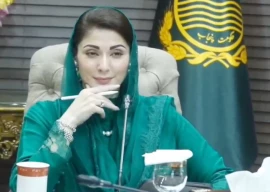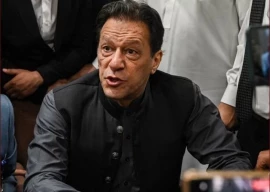
“There is a need for consensus following the policy of reconciliation to achieve the desired results in the war against terror and ensure peace and security,” the president told the concluding session of 5th National Conference of South Asian Free Media Association (Safma) on media, militancy and fair elections.
In an extraordinary message by the head of the state since the debate on a North Waziristan operation gained traction in recent days, Zardari cautioned against using force against a mindset which is widespread across segments of society.
He underscored the need for evolving a national consensus, similar to the one created before undertaking operations in Swat in 2008, in order to confront the terrorists head on.
“We agree that we need to act against militants, but are we ready for a possible blowback?” the president said, adding that any decision to use force would be taken with complete consensus, in the right context, and at an appropriate time.
Polarisation of society
The president stressed that as a nation we need to accommodate other nations. In an apparent dig at the main opposition party, the Pakistan Muslim League-Nawaz (PML-N), Zardari claimed that in the present situation, it seemed futile to talk about consensus with the opposition parties, lamenting that if we failed to reconcile amongst ourselves, we would not be able to reconcile with other countries.
Asking the country to pay close attention to the polarisation of society, the president reminded the audience of former Punjab governor Salmaan Taseer’s assassination.
“Taseer’s son was kidnapped. How many people tried to help his family? The answer is very few,” the president said.
‘Attack on our future’
“The attack on Malala Yousafzai was an attack on our values and on the future of our new generation,” President Zardari said, adding that it was wrong to justify the attack as a reaction against the war in Afghanistan or drone attacks.
He decried the militant mindset, saying that terrorists seek to impose their agenda by force.
“They [Malala and her schoolmates] represent a challenge to the terrorist assault on our values and Malala was targeted because of her defiance of the extremist mindset,” the president said, underscoring that the fight against extremism was going to be a long one and on all fronts.
Drones and cross-border raids
The president also highlighted the government’s firm stand against terrorism in any form, while referring to cross-border and drone attacks.
“We have consistently opposed drone attacks and we will continue to oppose them. Drone attacks were a violation of our sovereignty and are counterproductive,” he said.
He insisted that a blame game between the governments of Afghanistan and Pakistan would be counterproductive to the cause against militancy.
“Pakistan and Afghanistan should join hands in eliminating the terrorists and their hideouts,” the president said, adding that the government will not permit militants to use Pakistani territory to launch attacks outside its borders.
Taking ownership?
“As a president, I am accountable to the nation.” In a rare admission of the government’s failures, the president said that even though everything had not been ‘perfect’ during the past four and a half years, in view of the multidimensional problems, the government did its best to confront the challenges.
He emphasised that the problems faced by Pakistan were different from those faced by other countries.
“Your expectations are of a Westminster style, while my working circumstances are tribal, feudal and political,” the president said.
(Read: The crucial question)
Published in The Express Tribune, October 22nd, 2012.
COMMENTS (17)
Comments are moderated and generally will be posted if they are on-topic and not abusive.
For more information, please see our Comments FAQ
1731916090-0/sabrina-(3)1731916090-0-405x300.webp)


1732020599-0/BeFunky-collage-(73)1732020599-0-165x106.webp)
1731926127-0/zayn-(1)1731926127-0-165x106.webp)


1724319076-0/Untitled-design-(5)1724319076-0-270x192.webp)









@Mirza: I usually agree with most of your opinions but a requirement for consensus before he President can act against these people who are brutalizing Pakistani people is a cop out. Representative democracy - which both you and I support means that sometimes the executive may have to make unpopular decisions in the national interest. The fact that this irresponsible statement comes from a PPP leader does not make it any more defensible.
@Karachiwala: "how minority came into this???"
This is not a reference to religious minorities. This is a reference to a supposedly vocal minority that supports Taliban and pposes action against them.
@IceSoul: "Can we please stop kidding ourselves? There is no SILENT majority, there is just a very vocal MAJORITY."
Truer words were never spoken. But if a silent majority DOES exist then the PResident is not doing any service to the country by allowing the vocal minority to exercise a veto by insisting on consensus.
" There is no SILENT majority, there is just a very vocal MAJORITY. Most people may not explicitly support the Taliban due to the latter’s violent nature, but the religious beliefs of the Taliban and the majority of the Pakistani population are perfectly in sync."
@IceSoul: Yes, I can see how a consensual majority could prevent effective action against the Talibs. Hence the advantage of representative democracy of competing parties: the informed elect can defy majority opinion and minority representation to act against the will of the stupid majority. If the people don't like the results, they can vote out the bums in the next elections.
Why can't the Pak President openly admit that the military has not consented to launch operations in NW rather than making weak justifications ?
Let's take it this way; there are two types of Taliban, The ones who are fighting in Afghanistan (the good taliban) and the ones fighting in pakistan (the bad taliban)
Good taliban are supported by pakistan as in the end game, we need their support in installing a friendly government at our neighbour. (And realistically, majority of people of Afghanistan support Good Taliban)
Bad taliban are supported by USA, India, Iran, and some others to put Pakistan on its knees and to force Pakistan to quit supporting Good Taliban.
There are no good or bad taliban, these are just strategies. countries playing at the cost of poor citizens. Obviously we DO NOT need another ugly india on our Afghan Border.
@Sidewinder "consensus includes those who are going to be attacked"
The consensus also includes the "Attackers' and also the silent majority/minority. The result of this consensus will be that the attackers will decrease their attacks, the attacked will have less attacks and the silent mijority/minority will remain silent.
Long live CONSENSUS!!…
Wise decision by Ptresident Zardari. It will once and for all expose the Taliban apologists inside and outside parliament
Mr president if you mean national consensus is a must to take action then by that standard there is a national consensus that you leave presidency. Would you?.
Can we please stop kidding ourselves? There is no SILENT majority, there is just a very vocal MAJORITY. Most people may not explicitly support the Taliban due to the latter's violent nature, but the religious beliefs of the Taliban and the majority of the Pakistani population are perfectly in sync.Anyhow, even after slaughtering 40,000 people across Pakistan, the Taliban are still openly supported by many Pakistanis for e.g. Sheikh Rashid (a Pakistani politician).
Also, if we are to wait for a consensus, we may as well wait for a snowfall in the Sahara.
consensus includes those who are going to be attacked.....
And what has he done to build consensus?
how minority came into this???
"No anti-militant operation without consensus: Zardari"
No action without consensus means veto to violent minority.
There is too much support in Pakistan especially in Punjab for these fanatic terrorists. If we cannot have consensus even on this issue then the future is bleak at best. This demand by president is going to expose all popular rightwing leaders who claim to be with people not the terrorists. Everybody knows these fanatic terrorists have a support base and financial help from people and S. Arabia. Too bad hundreds of Malala could not force these elements to abandon their support to terrorists, one more Malala's sacrifices cannot be of much help.
The "no action without consensus" approach empowers the vocal and violent minority to render the majority will powerless; thus, the army retains maximum political power, for it can always claim expediency to justify its choice of future actions.
Contrast this rule-of-the-mob-or-army approach with the American one relegating the democratic seat of federal power, Washington, D.C., a central role:
"...it is the usual and proper center of political intrigue, from which the army especially should keep aloof, because the army must be true and faithful to the powers that be, and not be subjected to a temptation to favor one or other of the great parties into which our people have divided, and will continue to divide, it may be, with advantage to the whole." (Sherman, William T. (William Tecumseh) (2004-06-01). The Memoirs of General W. T. Sherman, Volume II., Part 4 (Kindle Locations 4299-4301). Public Domain Books. Kindle Edition.)
In a democracy like America you don't need a paralyzing consensus for the government to take action but the legitimacy of constitutional institutions and elected officials who can take decisive action, while the minority is secure that their voice is heard and that they may even see the day when they wield power, as the rights of minorities are respected.